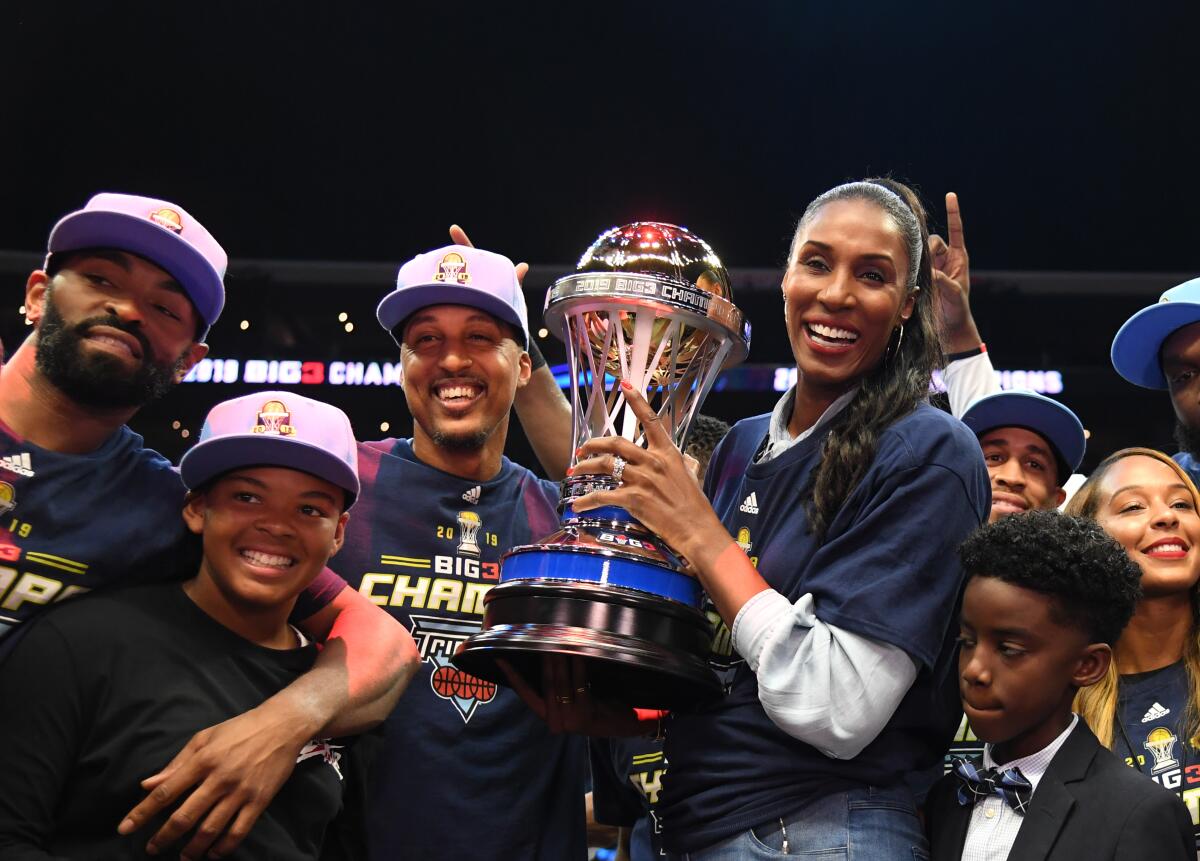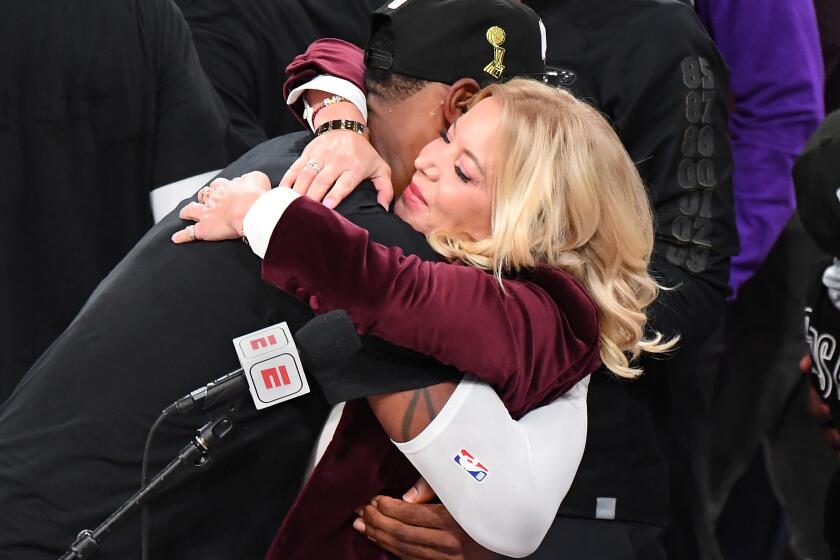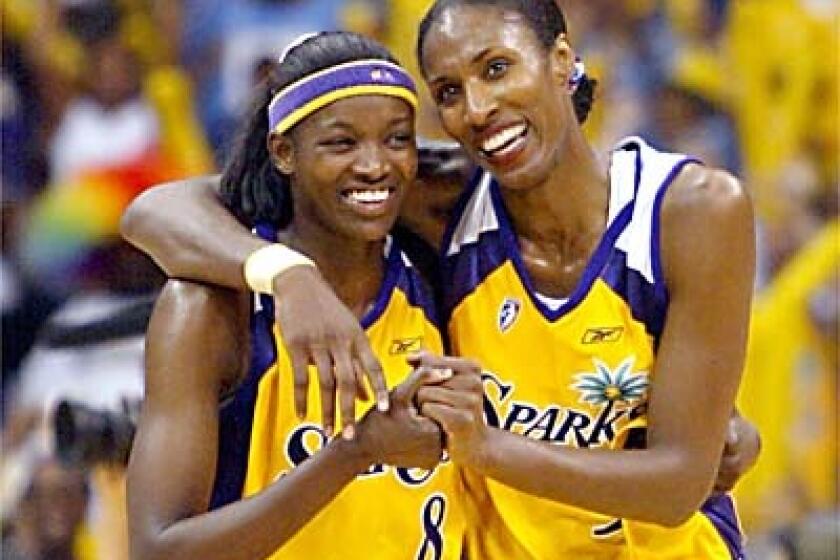Lisa Leslie pushes hard for change, 30 years after her first encounter with inequity

Just like she did during her Hall of Fame career, Lisa Leslie is hustling. Now the stakes are higher than a championship trophy.
Leslie, a two-time WNBA champion with the Sparks and four-time Olympic gold medalist, is part of three voting rights groups â LeBron Jamesâ More Than a Vote, Hoopers Vote and Rock the Vote â with less than a month before the election. This second act is what the Sparks legend believes could be her greatest area of influence.
âMy ability to speak, my ability to inspire people, thatâs my God-given talent,â Leslie said. âThe platform just happened to be the basketball court.â
From building her entire basketball career in L.A., graduating from Inglewood Morningside High, starring at USC and then becoming an inaugural member of the Sparks, Leslie now lives in Florida, where the 48-year-oldâs list of jobs is as long as her playing accomplishments. She is a realtor, public speaker and championship-winning coach in the BIG3, where she led former NBA All-Star Joe Johnson and the Triplets to the title last year. She wrote a second book about how to apply lessons learned on the court to the boardroom and launched a podcast in September with Sparks forward Chiney Ogwumike called âFront and Center.â
The biggest and best job she has is as a mother of two, to Lauren, 13, and 10-year-old Michael II, who goes by MJ. For them, Leslie proudly speaks out louder than ever during a time that requires action from everyone.
âI would never want my kids to look and say, âWell, mom, what did you do when this happened?ââ Leslie said. âI need for them to see that their mom was up, fighting for the right of the people, the people who look like us.â
After family squabbles and upheaval in the Lakers organization, Jeanie Buss finally gets to hold the trophy as an NBA championship owner.
Leslieâs children are old enough to watch and read the news. They know of the Black men and women killed by police and the ensuing protests calling for justice. She wants them to know it is their right and duty to speak up, whether it involves bullies at school or unfair policies.
âIf you see something happening to someone, your silence is confirmation that whatâs happening to them is OK,â Leslie said.
With More Than a Vote and Hoopers Vote, which is supported by Rock the Vote, Leslie hopes to bring awareness to and combat voter suppression and encourage voter education. Jamesâ group recently, with an assist from former President Barack Obama, announced it registered more than 20,000 people to serve as poll workers. Leslie shared a graphic on Twitter in September about the voter registration deadline in Florida.
Leslie doesnât care where potential voters get the information from, as long as they know. âItâs time for change,â Leslie said, âand we just gotta get people up and out for voting.â
Leslie plans to go through the ballot with her husband and kids â every race, evaluating each candidateâs pros and cons. Leslie marvels at how aware her kids are when it comes to social issues. Lauren, a budding tennis star, took a middle-school civics class that rivals one Leslie took in high school.
The younger generationâs ability to mobilize, using social media and rapid forms of communication, inspires Leslie. Watching the WNBA and NBA promote messages of social justice and voting this summer while playing physically and mentally taxing seasons in quarantine environments made Leslie proud to be involved in the sport.
âThe idea of the stereotypical athlete has always been cringe-worthy for me,â Leslie said. âItâs something that Iâve always tried to not be.â
Lisa Leslie has always been the most logical choice to become the first female immortalized with a statue in front of Staples Center.
During her playing days, Leslie juggled a modeling career that included photos in Vogue and a contract with Wilhelmina while winning three WNBA most valuable player awards. At Morningside, where Leslie scored 101 points in the first half of a game before the opponents walked out, she also was class president and had a 3.5 grade point average.
Despite her academic achievements, Leslie struggled to make the jump to college because of the SAT. She needed three tries at the test to earn the minimum score required of NCAA student-athletes.
Leslie wondered how to reconcile being named the 1989 Dial Award winner as the top female high school athlete scholar in the country while not being able to pass a standardized test. After initially low scores, Leslie took a prep course that cost between $500 and $600, she told The Times in 1991. She studied 25 vocabulary words a night, five days a week for three months and worked on extra math problems.
When she met the minimum score to reach NCAA eligibility, Leslie told The Times she was embarrassed it took her three attempts, but didnât shy away from confronting a system that historically favors wealthier students. In 2019, lawsuits filed against the University of California claimed that requiring applicants to take the SAT or ACT violated civil rights laws because the tests discriminate against disabled, low-income, multilingual and underrepresented minority students.
As a high school senior, Leslie pleaded at a school district meeting, asking how the structure could be improved.
About 30 years later, staring at another flawed system, Leslie is reminded of that teenager. She couldnât articulate it at the time, standing in front of a panel of adults who likely questioned her credentials, but she was âpart of the red line,â Leslie said recently.
Leslie is determined to help erase those lines.
âIâll never be silenced when it comes to talking about whatâs right,â Leslie said. âPeople who are in Inglewood would probably chuckle remembering me standing in front of everybody [saying] âSomething is wrong.ââ
More to Read
Go beyond the scoreboard
Get the latest on L.A.'s teams in the daily Sports Report newsletter.
You may occasionally receive promotional content from the Los Angeles Times.













